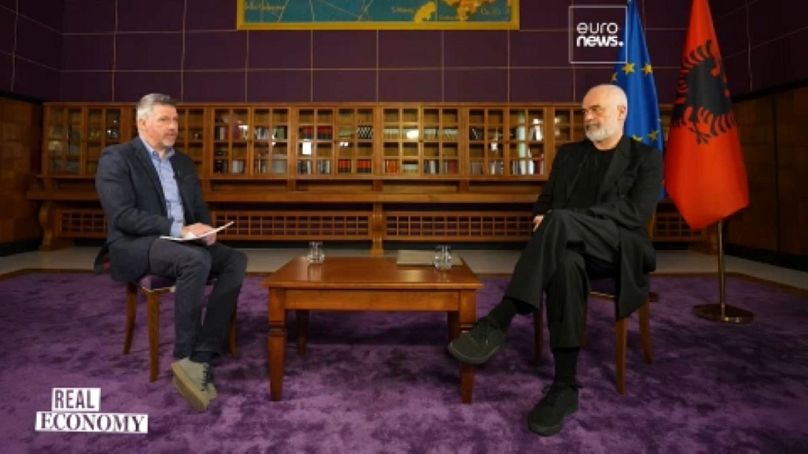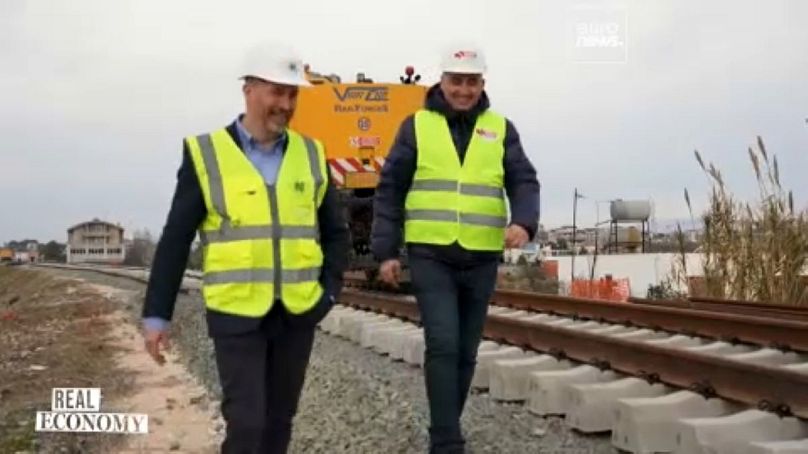Russia's full-scale invasion of Ukraine has reignited the EU's long-stalled enlargement process. Real Economy reports from Albania, to see how its bid to join the bloc is transforming the country's economy.
Albania applied for EU membership more than 15 years ago and while there is no set date for its accession, the EU's latest progress report shows the Balkan country is on track to develop a functioning market economy capable of withstanding market forces and the competitive pressures that come with being inside the bloc.
 ADVERTISEMENT
ADVERTISEMENT
 ADVERTISEMENT
ADVERTISEMENT
To be accepted, candidate countries must meet several economic criteria. This includes demonstrating macroeconomic stability, high-quality economic governance, a proper labour market and sufficient infrastructure.
Albania's economy enjoyed a robust recovery in 2021, which continued into 2022. That's despite the triple shock of a major earthquake in 2019, the COVID-19 pandemic and the war in Ukraine.
Like other parts of Europe, inflation in Albania has eased recently but remains elevated amid tight labour markets. However, real GDP growth for this year is forecast at 3.3 per cent. So what's the driving force behind Albania's economy?
A construction boom
To help pave the way for Western Balkan countries to join the bloc, Brussels designed a stabilisation and association process. This sets out the political and economic objectives for the region.
A lack of convergence between countries in the Western Balkan region and the rest of Europe remains a major sticking point for allowing them EU membership. This currently sits at around 35 per cent of the EU's average levels.
Economic convergence is sometimes described as the 'catch-up effect' or the circumstances that enable a country with a slower level of development and economic growth to catch up with a 'wealthier' country.
In the case of Albania, the country is investing heavily in its construction and tourism industries in a bid to boost economic growth.
The country's railway network is being completely overhauled with help from the EU's Economic and Investment Plan (EIP) for the Western Balkans.
In addition to revamping its rail network, train stations and the signalling system, the EIP is also being used to develop renewable energy projects, such as solar photovoltaic power plants, as well as digital infrastructure.
Bashkim Kasoruhu, the head of Albanian Railways, Project Implementation Unit, told Euronews, that the rail projects will have a huge economic, social and environmental impact, dramatically improving transport links inside Albania, the wider Balkan region and Europe.
“Connectivity is the most important aspect. You can imagine the impact of connecting these biggest ports. The port [Durres], [Tirana] airport and Tirana city centre where we have the public transport terminal will gather all the infrastructure in one hub," he said.
Once finished, a new rail link between Durres and Tirana, Albania’s two biggest cities, will cut the 40-minute road trip in half to around 20 minutes. In addition to the EU investment grant the project is also financed through a loan from the European Bank for Reconstruction and Development (EBRD).
A tourism success story
Albania's coastline stretches 450 kilometres along the Adriatic and Ionian Seas. Tourists are attracted to the country's Mediterranean climate, affordable prices and areas of natural beauty.
Sandwiched between Montenegro to the north and Greece to the south, it is connected to the Italian ports of Bari and Brindisi by relatively short ferry routes. With these geographical factors in mind, it might come as no surprise that Albania is fast becoming Europe's hottest tourist destination.
Albania welcomed a record-breaking 8.3 million tourists between January and September last year, 0.8 million more than the 7.5 million tourists it received in 2022. This upward trend is forecast to continue.
Euronews also spoke with the Prime Minister of Albania, Edi Rama. Click on the video in the media player above to watch the full interview.












